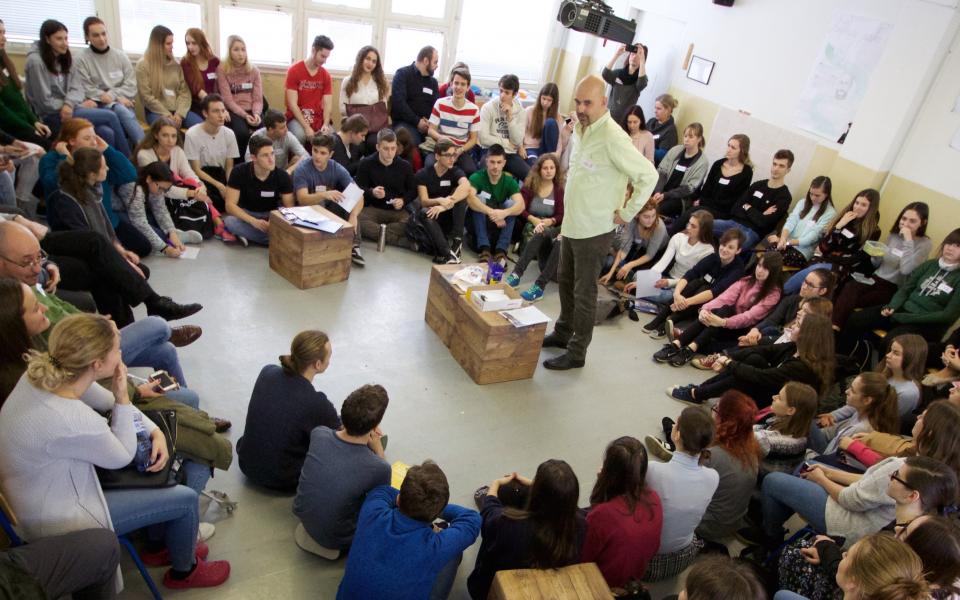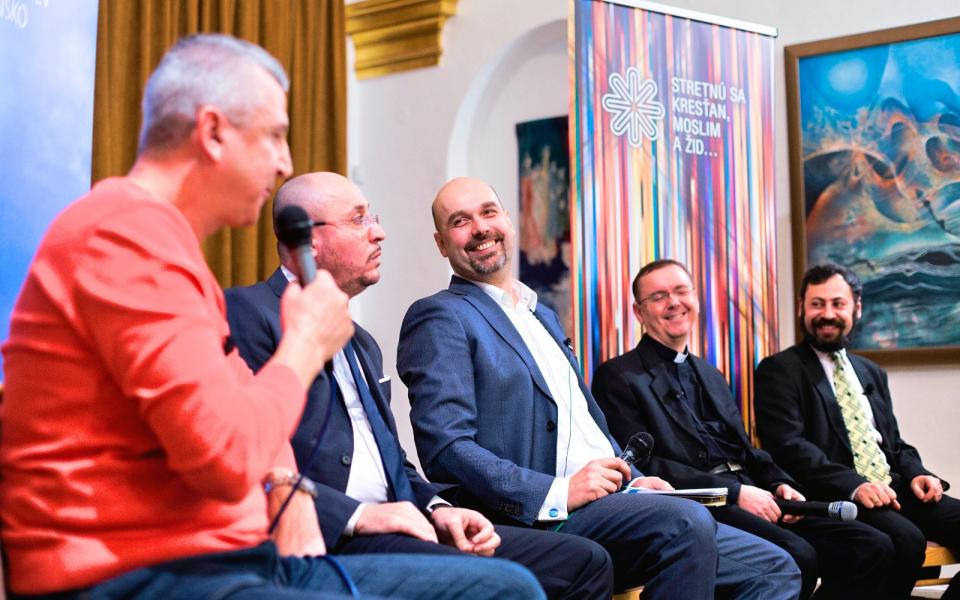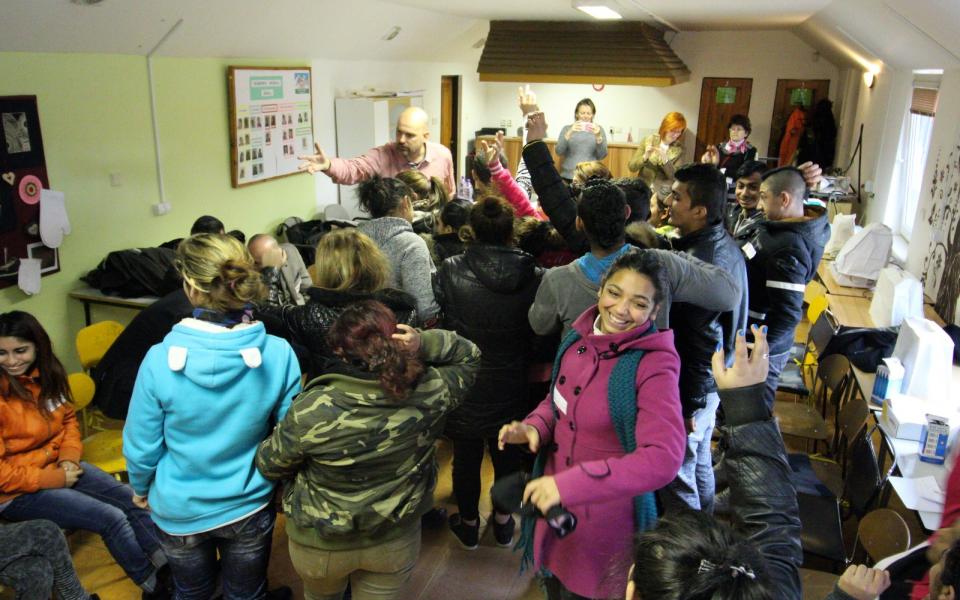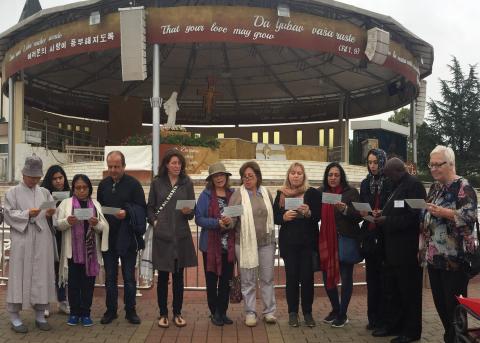
Moderator and main organizer Mário Nicolini, on behalf of the Forum of the World's Religions - Slovakia, and member of the Voices for a World Free of Nuclear Weapons Cooperation Circle, shares an update from his latest interfaith peacebuilding work:
"All in all, there is great appetite and momentum for interfaith."
“We have just concluded our speaking tour around 14 Slovak high schools featuring a rabbi, priest, and imam. We are cooperating with the Islamic Foundation, the Jewish Youth and a collective. The kids love the concept and teachers have engaged actively.”

“Our public events have sparked record interest. The last event in Bratislava filled the venue to the gunnels. One of the speakers was the Executive Secretary of the Catholic Bishops' Conference. Insiders described the event as a ‘new stage’ in interfaith dialogue in Slovakia. Plenty of youth showed up, which is very encouraging.”
"Our discussions have been effective in dispelling the most common myths about Judaism, Christianity, and Islam.”
“Major news media have covered our events. We have issued a public call on the Prime Minister to stop offending Muslims, supported by 400 leaders and citizens. Most importantly, questionnaires show that our discussions have been effective in dispelling the most common myths about Judaism, Christianity, and Islam.” “All in all, there is great appetite and momentum for interfaith in Slovakia and Central Europe. We are looking for partners (and continued funding) to allow us to seize the momentum and expand the use of dialogue to enhance understanding and cooperation.”

In the Roma village
Read a moving account of our work that was published in one of the national papers. It gives the local context and delves into the design we've used to reach the hearts and minds of our children.
-
The following is an automatic English translation of the original Slovak article. Please excuse translation errors.
A Jew, Muslim and Christian Meet for Dialogue: Slovak Reality, Not a Joke
Andrej Bán, Denník N, 23 Jan 2017
They have been conducting dialogue for three months, and they do not avoid even hot topics. Students and the general public. Jewish rabbi, Muslim imam and Evangelical theologian. A unique project on Tuesday evening is coming to Bratislava.
First, let's say something about stereotypes. Nothing like a typical Jew (Muslim, Christian) exists, of course. Jew? Curled nose, global domination. Muslim? Beard, terrorist. Christian? We are embarrassed ... it is ourselves.
These (and similar) ideas have not only arisen from the conspiracy in crazy people, they are, the pillars of our identity. What we do not know we fear at best and hate at worst. We consider ourselves as "better" or even the only one right. And not just us, it's a universal human desire, a defense mechanism against the complexity of the world.
Three paths to one God
If, for nothing else, the interreligious dialogue, organized and moderated by the Executive Director of the Forum of the World's Religions - Slovakia, Mário Nicolini, a security analyst and political scientist, is valuable to our new experience. Of course, not all Jews are as nice as Misha Kapustin, and not all Muslims are mild as Mohamad Hasna, but only the two in a friendly and open dialogue are proof of diversity.
Each of the three monotheistic religions has different directions, from liberal to ultraconservative, from open to closed. Three ways to one God have many pavements. It's just about which one will prevail. And yes, the world of Islam, about 1.5 billion people today, faces this challenge. All the more than what we see in the media, in particular, is its militant face.
Nine prejudices and what to do with them
Since November, this "trio of heretics" - as Mario once joked in a narrow circle at the petrol station under the influence of conservative criticism - Moldava over Bodva, Kezmarok and other twelve cities. They talked with 660 high school students and dozens of teachers. They handed out anonymous questionnaires in which they formulated nine (3 x 3) most frequent prejudices. Here are three of them:
- Jews are money- and profit-oriented.
- Muslims do not respect women.
- A Christian is intolerant of other opinions.
These and other themes should be evaluated by students on a scale of 1 (I totally agree) to 5 (I do not agree at all). The result? Prejudices most often fluctuated around the value of 3, ie in the middle (yes and no), with a total average change from 3.27 (after a 90-minute discussion at school) to 3.51 (after discussion).
What does it say? For deeper conclusions, the questionnaires are yet to be evaluated, but the discussions do help to change attitudes. This is important in the country where Prime Minister Fico wants to monitor all Muslims as a terrorist threat (November 2015) or does not want Muslims to hurt tourists in the squares (February 2018).
The mother of all conspiracies ("Jews dominate the world") is no longer as popular among the youngsters as it used to be. Nowadays, there are opinions that Muslims do not respect other religions or that Jews are very wealthy. And the most common are the prejudices (in order) against Muslims and Christians, the Jews are third. But beware, unjustified prejudices need to be distinguished from justified concerns. The criterion? Reliable is the principle of collective guilt. Whoever applies collective guilt harbors prejudice.
Rabbi Kapustin, who came from Crimea to Slovakia after the annexation of Russia and has experience with young people in Germany or England, says clearly: "The doctrines of every religion are just words and must be filled by people. I have seen that students in Slovakia can think critically, they ask good questions. This is the most important thing for me. And they are more reasonable than we were at their age. "
Ondrej, Míša or my faith
Monday morning at the Lutheran Secondary Grammar School in Bratislava. Guests are spreading to a tasting table: the rabbi donated to students a chocolate cake, the imam presents chalva, dates and other oriental sweets. Mário asks everyone to write with a pen on a paper that sticks to his chest, a baptismal (pardon, first) name. We sit in a circle and we're talking.
"Our pupils have not really seen a Muslim personally, and if they know a Jew, they usually do not know about it," says a smiling teacher who is enthusiastic about such a debate. Is it really possible that they are all sitting under a cross (and) rabbi and imam? - an unspoken question hangs up in the air. More surprises are coming.
"In the past, the Jews had mostly good cohabitation with Muslims in Spain and the Middle East, better than Christians in Europe," Rabbi Kapustin says. Imam Hasna agrees, "Wise words, nothing to add. The Qur'an commands to respect the people of the Book. We need to de-politicize relations between religions, we do not have to solve global conflicts in Slovakia. Differences in belief do not mean we have to be automatically against each other. I'm sure of my faith and I do not feel threatened when I am having fun with others. And it does not make sense to persuade the students whether Ondrej is better (Lutheran theologian Ondrej Prostredník is not here today), Míša or my faith. I just need to show them that we can talk together. " This time the rabbi nods.
Lutheran theologian Frantisek Ábel works in the academic field. He also promotes dialogue despite diversity. "Belief according to tradition brings to man a conviction of what is good for him. Feeling that something transcends us makes us a little worried. We are siblings and siblings should be decent to one another. They may not have one opinion. God created us as an individual, but at the same time in the community."
On the question of one of the educators, whether the differences stem from the Scripture, Abel says, "Unfortunately, we often pull things out of context. As I use to say, we smash those who disagree with us with the Bible to convince them. That's a tragedy. "
Discussion also comes to the radical forms of faith. Mário quotes from Facebook the reaction that "the truth about the immorally living Prophet Muhammad must be shown" or "Jesus did not meet the Pharisees or the Sadducees to spread a common understanding, and therefore we need no dialogue with the Muslims and the Jews." Three theologians comment and disprove the absurdity. Again, the unspoken question hangs in the air: Who am I to know exactly what the Prophet Muhammad or Jesus said?
On the question of whether the religious leaders would accept a person who would like to be a Jew, a Muslim and a Christian at the same time - God is one - they pause. "God's command passes through all three traditions. And not just them, it is the foundation for all mankind. If we are not to be killed, there is no other way," says Abel.
"It is not possible theologically according to Islam. Let us only mention the nature of Jesus: our teachings about this are incompatible. For us he was a man, one of the prophets, for Christians he is the Son of God," adds Muslim Hasna. Jew Kapustin saved his word to the end: "I'll tell it a bit sexistically. If it was a lady, no problem, but with the man it would be a little more complicated, to make the circumcision twice." Laughing laughing laughing.
After an initial half-hour with teachers only, students come and sit in a circle. "While we are different in matters of faith - are we able to agree on essential matters?" Mário sets a key theme and invites them to stand in three groups. The largest is formed by those who agree with the statement. About five of them disagree. "Intelligence ... priorities ..." they explain their arguments.
The young, especially the girls, can not hold to smile at the rabbi. Handsome man. They ask him why he came. "It’s warm in here, it's cold outside, and I'm glad to sit down with good people," he gets them on his side immediately. To the next question, whether a member of one faith can go to a different temple, the imam responds: "Why not? Our prayer room, because there is no mosque in Slovakia, is regularly visited by one elderly practicing Catholic. I never thought to ask him what he was doing there. He apparently prays and feels good in our temple ..."
The golden rule
The beginnings of efforts for interreligious dialogue in Slovakia extend into the period just after November '89. At that time the popular religions and spiritual orientations were Buddhism or Yoga. Mário Nicolini joined this process in 2014, when he and his friends founded the Forum of the World's Religions - Slovakia, with the ambition to organize a Parliament of the World’s Religions, a global meeting of similar initiatives taking place globally since the end of the 19th century. This has not happened (it will be in Canada), but the idea of working especially with young people who are subject to various hoaxes and radicalization has remained acute to this day.
"There is a darkening atmosphere in society. In 2001 there was a terrorist attack on the United States, followed by Madrid, London, Anders Breivik ... I am a Catholic open to dialogue, admirer of the reform-minded Second Vatican Council, who wants to overcome his limits as a believer, and I work with public opinion. I perceive the risks associated with radical interpretations of Islam. Sophisticated propaganda techniques also radicalize people in the Western world. But murder in the name of faith is unacceptable, for me responsibility lies not with Islam as such but radical, criminal elements," adds Nicolini.
Asking what these discussions have given him personally, he says he has deepened his faith through them. His faith as a Catholic, and his faith in dialogue. He mentions the golden rule that they frequently quote to students: "Do to the other what you want them to do to you.“ It's always about individuals. We all have some prejudices, right?
And what does he think about the fact that Muslims are not respecting other religions, where would Nicolini place himself on a scale of 1 to 5? "I'm slightly more optimistic than the average of the students, that is, 4," he says first, but then he thinks out loud: "This statement concerns Muslims as such, does it not? From my point of view it is a prejudice and I do not support it. So 5, completely disagree."
